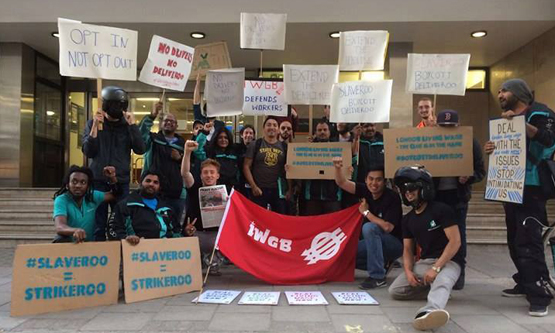
On Tuesday 14 November, the Central Arbitration Committee (CAC) ruled in favour of the app-based food delivery company Deliveroo in a landmark tribunal case concerning basic worker rights and protections. The decision comes after a year-long struggle waged by the company’s riders – organised by the Independent Workers Union of Great Britain (IWGB) and supported centrally by comrades of the RCG – in a bid to secure a change in their employment status from that of ‘self-employed contractor’ to ‘worker’.
Under the status of ‘self-employed contractors’, Deliveroo riders are not entitled to basic rights and protections, including holiday pay, sick pay or even the right to the national minimum wage. Perhaps most significantly, they lack the right to official union representation with which to negotiate pay and conditions with their employer. This re-branding of casualised labour is the standard practice of many companies within the so-called ‘gig economy’.
In the CAC’s report on the ruling it explained that the central issue that led them to rule in Deliveroo’s favour was a substitution clause in the company’s latest contract that apparently allows drivers to essentially subcontract persons unknown to the company to perform their job for them. This is despite the fact that riders that seek to work for Deliveroo not only undergo specialised training but also immigration and criminal background checks all performed by the company. It should follow then that Deliveroo expects its ‘on-the-books’ riders to perform such checks on all those they ask to ‘substitute’ for them. As the ruling explains, ‘the central and insuperable difficulty for the Union is that we find that the substitution right to be genuine, in the sense that Deliveroo has decided in the New Contract that Riders have a right to substitute themselves both before and after they have accepted a particular job’.
It should be of concern to anyone working within the ‘gig economy’ that this substitution clause could be invoked so effortlessly even with the most blatant of intentions – to prop up an anti-worker ruling – and still be seen as ‘genuine’ by the courts, especially considering that the clause was inserted into a new contract sent to riders just 11 days before the tribunal started.
In a statement, the IWGB’s General Secretary Jason Moyer-Lee said: ‘It seems that after a series of defeats, a so-called gig economy company has finally found a way to game the system.’ Such is the nature of class justice.
The Deliveroo ruling came just a week after taxi drivers working for tech-based logistics firm Uber were once again confirmed as being entitled to a ‘worker’ status after defeating the company’s first appeal.
As well as seeking to change the employment status of riders, the case put forward by the IWGB also sought official union recognition from the £1.5bn valued company, Deliveroo. In order to achieve recognition the union would need to be able to prove to the CAC tribunal that it had 10% union membership and at least 50% support for official recognition from riders within the outlined bargaining unit – which was, in this case, the Deliveroo zone of ‘Camden and Kentish Town’.
The organisation and will of the unionised riders has been such that the CAC ruling reported that ‘the union has been able to demonstrate considerable and consistent levels of support over the unfortunately long period of this case, notwithstanding Deliveroo’s opposition to the Union’s claim, and notwithstanding the difficulties of organising and contacting other riders and the individual nature of the work’. This is a positive indication for the future of the riders’ struggle. Despite a campaign of intimidation and disinformation by Deliveroo against the union, the riders have developed an appetite for collective bargaining within the company’s rank and file. The report continues: ‘From all the information before us, if the riders had been workers within the meaning of s.296 of the [Trade Union and Labour Relations (Consolidation)] Act [1992], we would have found that a majority of the riders in the proposed bargaining unit would support the union’s bid for collective bargaining on pay, hours and holiday.’
This latest development demonstrates clearly the limitations of relying on bourgeois state institutions of law to dole out concessions. Unions such as the IWGB and its members must continue to fight to build political power through the grassroots organisation of the most precarious sections of working class.




